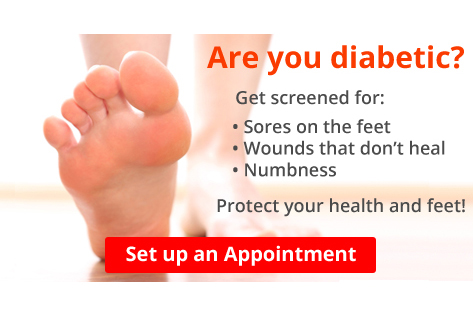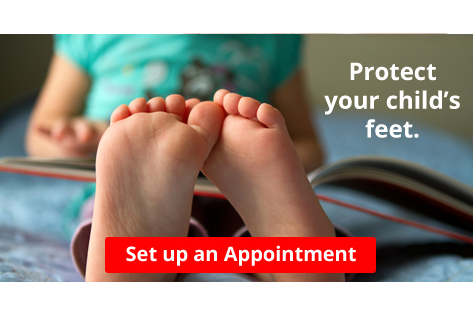Blog
Is My Child Suffering From Athlete’s Foot?
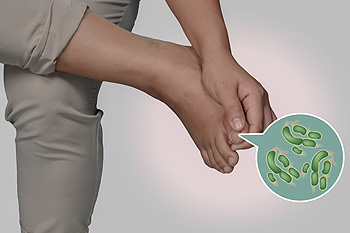 Many people get athlete’s foot, including children. Your child may complain of itching on the feet or may possibly experience a burning sensation. Occasionally there may be redness or an unpleasant odor that may develop from in between the toes. These may all be symptoms of athlete's foot, an uncomfortable fungal infection that typically develops within the feet and can possibly travel to other parts of the body if left untreated. It’s recommended for you and your child to consult with a podiatrist, who may test for the fungus by taking a small skin sample of the affected area. Treatment often consists of applying a powder or cream which may contain medicine to kill the fungus, enabling the foot to feel better quickly. Additionally, making sure your child does not wear shoes as often as possible and keeping the feet dry is important in keeping the fungus from growing. Prevention of this condition may include putting antifungal powder in your child’s footwear and drying the feet thoroughly, especially in between the toes.
Many people get athlete’s foot, including children. Your child may complain of itching on the feet or may possibly experience a burning sensation. Occasionally there may be redness or an unpleasant odor that may develop from in between the toes. These may all be symptoms of athlete's foot, an uncomfortable fungal infection that typically develops within the feet and can possibly travel to other parts of the body if left untreated. It’s recommended for you and your child to consult with a podiatrist, who may test for the fungus by taking a small skin sample of the affected area. Treatment often consists of applying a powder or cream which may contain medicine to kill the fungus, enabling the foot to feel better quickly. Additionally, making sure your child does not wear shoes as often as possible and keeping the feet dry is important in keeping the fungus from growing. Prevention of this condition may include putting antifungal powder in your child’s footwear and drying the feet thoroughly, especially in between the toes.
Athlete’s foot is an inconvenient condition that can be easily reduced with the proper treatment. If you have any concerns about your feet and ankles, contact Genine Befumo, DPM from University Foot and Ankle Center, L.L.C. Our doctor will treat your foot and ankle needs.
Athlete’s Foot: The Sole Story
Athlete's foot, also known as tinea pedis, can be an extremely contagious foot infection. It is commonly contracted in public changing areas and bathrooms, dormitory style living quarters, around locker rooms and public swimming pools, or anywhere your feet often come into contact with other people.
Solutions to Combat Athlete’s Foot
- Hydrate your feet by using lotion
- Exfoliate
- Buff off nails
- Use of anti-fungal products
- Examine your feet and visit your doctor if any suspicious blisters or cuts develop
Athlete’s foot can cause many irritating symptoms such as dry and flaking skin, itching, and redness. Some more severe symptoms can include bleeding and cracked skin, intense itching and burning, and even pain when walking. In the worst cases, Athlete’s foot can cause blistering as well. Speak to your podiatrist for a better understanding of the different causes of Athlete’s foot, as well as help in determining which treatment options are best for you.
If you have any questions please feel free to contact our office located in Monroe Township, NJ . We offer the newest diagnostic and treatment technologies for all your foot and ankle needs.
Read more about Athlete's FootIs My Child Suffering From Athlete’s Foot?
 Many people get athlete’s foot, including children. Your child may complain of itching on the feet or may possibly experience a burning sensation. Occasionally there may be redness or an unpleasant odor that may develop from in between the toes. These may all be symptoms of athlete's foot, an uncomfortable fungal infection that typically develops within the feet and can possibly travel to other parts of the body if left untreated. It’s recommended for you and your child to consult with a podiatrist, who may test for the fungus by taking a small skin sample of the affected area. Treatment often consists of applying a powder or cream which may contain medicine to kill the fungus, enabling the foot to feel better quickly. Additionally, making sure your child does not wear shoes as often as possible and keeping the feet dry is important in keeping the fungus from growing. Prevention of this condition may include putting antifungal powder in your child’s footwear and drying the feet thoroughly, especially in between the toes.
Many people get athlete’s foot, including children. Your child may complain of itching on the feet or may possibly experience a burning sensation. Occasionally there may be redness or an unpleasant odor that may develop from in between the toes. These may all be symptoms of athlete's foot, an uncomfortable fungal infection that typically develops within the feet and can possibly travel to other parts of the body if left untreated. It’s recommended for you and your child to consult with a podiatrist, who may test for the fungus by taking a small skin sample of the affected area. Treatment often consists of applying a powder or cream which may contain medicine to kill the fungus, enabling the foot to feel better quickly. Additionally, making sure your child does not wear shoes as often as possible and keeping the feet dry is important in keeping the fungus from growing. Prevention of this condition may include putting antifungal powder in your child’s footwear and drying the feet thoroughly, especially in between the toes.
Athlete’s foot is an inconvenient condition that can be easily reduced with the proper treatment. If you have any concerns about your feet and ankles, contact one of our podiatrists from University Foot and Ankle Center, L.L.C. Our doctors will treat your foot and ankle needs.
Athlete’s Foot: The Sole Story
Athlete's foot, also known as tinea pedis, can be an extremely contagious foot infection. It is commonly contracted in public changing areas and bathrooms, dormitory style living quarters, around locker rooms and public swimming pools, or anywhere your feet often come into contact with other people.
Solutions to Combat Athlete’s Foot
- Hydrate your feet by using lotion
- Exfoliate
- Buff off nails
- Use of anti-fungal products
- Examine your feet and visit your doctor if any suspicious blisters or cuts develop
Athlete’s foot can cause many irritating symptoms such as dry and flaking skin, itching, and redness. Some more severe symptoms can include bleeding and cracked skin, intense itching and burning, and even pain when walking. In the worst cases, Athlete’s foot can cause blistering as well. Speak to your podiatrist for a better understanding of the different causes of Athlete’s foot, as well as help in determining which treatment options are best for you.
If you have any questions please feel free to contact one of our offices located in East Brunswick and Monroe Township, NJ. We offer the newest diagnostic and treatment technologies for all your foot and ankle needs.
Read more about Athlete's FootPossible Treatments for Rheumatoid Arthritis
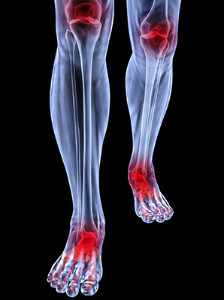 A disease involving the immune system in which the joints are inflamed is rheumatoid arthritis. Standing and walking may often become difficult, as these movements involve use of the joints. Recent research has shown that common treatments for this condition may include anti-inflammatory drugs or surgery if no other option is available. Occasionally the feet may produce symptoms indicative of rheumatoid arthritis, such as stiffness and pain in the ankle that spreads throughout the foot. It has been shown that there may be a link between higher body weight and this particular form of arthritis developing faster than other forms. Certain remedies may bring comfort, including choosing shoes that have proper arch support. Stretching may be another option, possibly relieving pain and providing joint mobility. Consult with your podiatrist for a proper diagnosis and treatment if you think have symptoms of rheumatoid arthritis.
A disease involving the immune system in which the joints are inflamed is rheumatoid arthritis. Standing and walking may often become difficult, as these movements involve use of the joints. Recent research has shown that common treatments for this condition may include anti-inflammatory drugs or surgery if no other option is available. Occasionally the feet may produce symptoms indicative of rheumatoid arthritis, such as stiffness and pain in the ankle that spreads throughout the foot. It has been shown that there may be a link between higher body weight and this particular form of arthritis developing faster than other forms. Certain remedies may bring comfort, including choosing shoes that have proper arch support. Stretching may be another option, possibly relieving pain and providing joint mobility. Consult with your podiatrist for a proper diagnosis and treatment if you think have symptoms of rheumatoid arthritis.
Because RA affects more than just your joints, including the joints in your feet and ankles, it is important to seek early diagnosis from your podiatrist if you feel like the pain in your feet might be caused by RA. For more information, contact Genine Befumo, DPM of University Foot and Ankle Center, L.L.C. Our doctor will assist you with all of your podiatric concerns.
What Is Rheumatoid Arthritis?
Rheumatoid Arthritis (RA) is an autoimmune disorder in which the body’s own immune system attacks the membranes surrounding the joints. Inflammation of the lining and eventually the destruction of the joint’s cartilage and bone occur, causing severe pain and immobility.
Rheumatoid Arthritis of the Feet
Although RA usually attacks multiple bones and joints throughout the entire body, almost 90 percent of cases result in pain in the foot or ankle area.
Symptoms
- Swelling and pain in the feet
- Stiffness in the feet
- Pain on the ball or sole of feet
- Joint shift and deformation
Diagnosis
Quick diagnosis of RA in the feet is important so that the podiatrist can treat the area effectively. Your doctor will ask you about your medical history, occupation, and lifestyle to determine the origin of the condition. Rheumatoid Factor tests help to determine if someone is affected by the disease.
If you have any questions please feel free to contact our office located in Monroe Township, NJ . We offer the newest diagnostic and treatment technologies for all your foot and ankle needs.
Read more about Rheumatoid Arthritis in the FeetPossible Treatments for Rheumatoid Arthritis
 A disease involving the immune system in which the joints are inflamed is rheumatoid arthritis. Standing and walking may often become difficult, as these movements involve use of the joints. Recent research has shown that common treatments for this condition may include anti-inflammatory drugs or surgery if no other option is available. Occasionally the feet may produce symptoms indicative of rheumatoid arthritis, such as stiffness and pain in the ankle that spreads throughout the foot. It has been shown that there may be a link between higher body weight and this particular form of arthritis developing faster than other forms. Certain remedies may bring comfort, including choosing shoes that have proper arch support. Stretching may be another option, possibly relieving pain and providing joint mobility. Consult with your podiatrist for a proper diagnosis and treatment if you think have symptoms of rheumatoid arthritis.
A disease involving the immune system in which the joints are inflamed is rheumatoid arthritis. Standing and walking may often become difficult, as these movements involve use of the joints. Recent research has shown that common treatments for this condition may include anti-inflammatory drugs or surgery if no other option is available. Occasionally the feet may produce symptoms indicative of rheumatoid arthritis, such as stiffness and pain in the ankle that spreads throughout the foot. It has been shown that there may be a link between higher body weight and this particular form of arthritis developing faster than other forms. Certain remedies may bring comfort, including choosing shoes that have proper arch support. Stretching may be another option, possibly relieving pain and providing joint mobility. Consult with your podiatrist for a proper diagnosis and treatment if you think have symptoms of rheumatoid arthritis.
Because RA affects more than just your joints, including the joints in your feet and ankles, it is important to seek early diagnosis from your podiatrist if you feel like the pain in your feet might be caused by RA. For more information, contact one of our podiatrists of University Foot and Ankle Center, L.L.C. Our doctors will assist you with all of your podiatric concerns.
What Is Rheumatoid Arthritis?
Rheumatoid Arthritis (RA) is an autoimmune disorder in which the body’s own immune system attacks the membranes surrounding the joints. Inflammation of the lining and eventually the destruction of the joint’s cartilage and bone occur, causing severe pain and immobility.
Rheumatoid Arthritis of the Feet
Although RA usually attacks multiple bones and joints throughout the entire body, almost 90 percent of cases result in pain in the foot or ankle area.
Symptoms
- Swelling and pain in the feet
- Stiffness in the feet
- Pain on the ball or sole of feet
- Joint shift and deformation
Diagnosis
Quick diagnosis of RA in the feet is important so that the podiatrist can treat the area effectively. Your doctor will ask you about your medical history, occupation, and lifestyle to determine the origin of the condition. Rheumatoid Factor tests help to determine if someone is affected by the disease.
If you have any questions please feel free to contact one of our offices located in East Brunswick and Monroe Township, NJ. We offer the newest diagnostic and treatment technologies for all your foot and ankle needs.
Read more about Rheumatoid Arthritis in the FeetDo your Child's Feet Hurt?
Can Being Obese Affect My Feet?
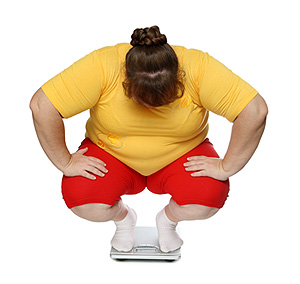 Obesity is a worldwide issue, affecting people from many different countries, and is often seen as a gateway for serious health conditions. The extra weight may cause imbalanced walking, consequently putting people at risk for falls and ankle sprains or breaks. Some people experience swollen feet, often being a sign of circulatory problems, in addition to developing cracked heels, originating from additional pressure on the feet. Practicing proper foot hygiene is crucial for preventing many different kinds of foot disorders. Drying the skin between the toes is important, as this habit may prevent fungal infections from developing. Additionally, because some feet may be wider than average, it is critical to wear a well-fitted shoe. If you are experiencing health issues in your feet, a consultation with a podiatrist is advised for a diagnosis and treatment options.
Obesity is a worldwide issue, affecting people from many different countries, and is often seen as a gateway for serious health conditions. The extra weight may cause imbalanced walking, consequently putting people at risk for falls and ankle sprains or breaks. Some people experience swollen feet, often being a sign of circulatory problems, in addition to developing cracked heels, originating from additional pressure on the feet. Practicing proper foot hygiene is crucial for preventing many different kinds of foot disorders. Drying the skin between the toes is important, as this habit may prevent fungal infections from developing. Additionally, because some feet may be wider than average, it is critical to wear a well-fitted shoe. If you are experiencing health issues in your feet, a consultation with a podiatrist is advised for a diagnosis and treatment options.
Obesity has become very problematic at this point in time and can have extremely negative effects on the feet. If you’re an obese individual and are concerned about your feet, contact Genine Befumo, DPM from University Foot and Ankle Center, L.L.C. Our doctor can provide the care you need to keep you pain-free and on your feet.
Obesity and Your Feet
Since your feet are what support your entire weight when standing, any additional weight can result in pain and swelling. Being overweight is one of the main contributors to foot complications.
Problems & Complications
Extra Weight – Even putting on just a few extra pounds could create serious complications for your feet. As your weight increases, your balance and body will shift, creating new stresses on your feet. This uneven weight distribution can cause pain, even while doing the simplest tasks, such as walking.
Diabetes – People who are overweight are at serious risk of developing type-2 diabetes, which has a drastic impact on the health of your feet. As you get older, your diabetes might worsen, which could lead to loss of feeling in your feet, sores, and bruises. You could also become more prone to various infections.
Plantar fasciitis – Pressure and stress that is placed on muscles, joints, and tendons can trigger plantar fasciitis, which is an inflammation of tissue that forms along the bottom of the foot.
If you have any questions please feel free to contact our office located in Monroe Township, NJ . We offer the newest diagnostic and treatment technologies for all your foot and ankle needs.
Can Being Obese Affect My Feet?
 Obesity is a worldwide issue, affecting people from many different countries, and is often seen as a gateway for serious health conditions. The extra weight may cause imbalanced walking, consequently putting people at risk for falls and ankle sprains or breaks. Some people experience swollen feet, often being a sign of circulatory problems, in addition to developing cracked heels, originating from additional pressure on the feet. Practicing proper foot hygiene is crucial for preventing many different kinds of foot disorders. Drying the skin between the toes is important, as this habit may prevent fungal infections from developing. Additionally, because some feet may be wider than average, it is critical to wear a well-fitted shoe. If you are experiencing health issues in your feet, a consultation with a podiatrist is advised for a diagnosis and treatment options.
Obesity is a worldwide issue, affecting people from many different countries, and is often seen as a gateway for serious health conditions. The extra weight may cause imbalanced walking, consequently putting people at risk for falls and ankle sprains or breaks. Some people experience swollen feet, often being a sign of circulatory problems, in addition to developing cracked heels, originating from additional pressure on the feet. Practicing proper foot hygiene is crucial for preventing many different kinds of foot disorders. Drying the skin between the toes is important, as this habit may prevent fungal infections from developing. Additionally, because some feet may be wider than average, it is critical to wear a well-fitted shoe. If you are experiencing health issues in your feet, a consultation with a podiatrist is advised for a diagnosis and treatment options.
Obesity has become very problematic at this point in time and can have extremely negative effects on the feet. If you’re an obese individual and are concerned about your feet, contact one of our podiatrists from University Foot and Ankle Center, L.L.C. Our doctors can provide the care you need to keep you pain-free and on your feet.
Obesity and Your Feet
Since your feet are what support your entire weight when standing, any additional weight can result in pain and swelling. Being overweight is one of the main contributors to foot complications.
Problems & Complications
Extra Weight – Even putting on just a few extra pounds could create serious complications for your feet. As your weight increases, your balance and body will shift, creating new stresses on your feet. This uneven weight distribution can cause pain, even while doing the simplest tasks, such as walking.
Diabetes – People who are overweight are at serious risk of developing type-2 diabetes, which has a drastic impact on the health of your feet. As you get older, your diabetes might worsen, which could lead to loss of feeling in your feet, sores, and bruises. You could also become more prone to various infections.
Plantar fasciitis – Pressure and stress that is placed on muscles, joints, and tendons can trigger plantar fasciitis, which is an inflammation of tissue that forms along the bottom of the foot.
If you have any questions please feel free to contact one of our offices located in East Brunswick and Monroe Township, NJ. We offer the newest diagnostic and treatment technologies for all your foot and ankle needs.
Read more about How Obesity Affects Your FeetBlog Archives
- May 2024
- April 2024
- March 2024
- February 2024
- January 2024
- December 2023
- November 2023
- October 2023
- September 2023
- August 2023
- July 2023
- June 2023
- May 2023
- April 2023
- March 2023
- February 2023
- January 2023
- December 2022
- November 2022
- October 2022
- September 2022
- August 2022
- July 2022
- June 2022
- May 2022
- April 2022
- March 2022
- February 2022
- January 2022
- December 2021
- November 2021
- October 2021
- September 2021
- August 2021
- July 2021
- June 2021
- May 2021
- April 2021
- March 2021
- February 2021
- January 2021
- December 2020
- November 2020
- October 2020
- September 2020
- August 2020
- July 2020
- June 2020
- May 2020
- April 2020
- March 2020
- February 2020
- January 2020
- December 2019
- November 2019
- October 2019
- September 2019
- August 2019
- July 2019
- June 2019
- May 2019
- April 2019
- March 2019
- February 2019
- January 2019
- December 2018
- November 2018
- October 2018
- September 2018
- August 2018
- July 2018
- June 2018
- May 2018
- April 2018
- March 2018
- February 2018
- January 2018
- December 2017
- November 2017
- October 2017
- September 2017
- August 2017
- July 2017
- June 2017
- May 2017
- April 2017
- March 2017
- February 2017
- January 2017
- December 2016
- November 2016
- October 2016
- September 2016
- August 2016
- July 2016
- June 2016
- May 2016
- April 2016
- March 2016
- February 2016
- January 2016
- December 2015
- November 2015
- October 2015
- September 2015
- August 2015
- July 2015
- June 2015
- May 2015
- April 2015
- March 2015
- February 2015
- January 2015
- December 2014
- November 2014
- October 2014
- September 2014
- August 2014
- July 2014


